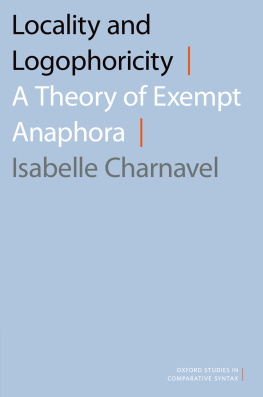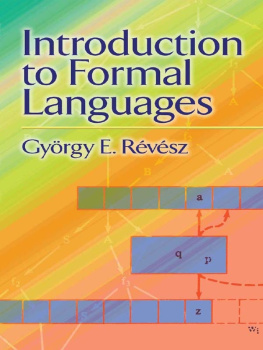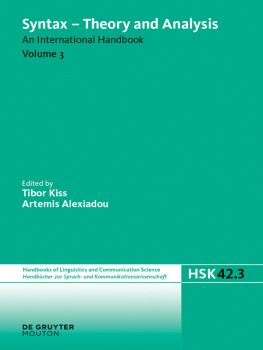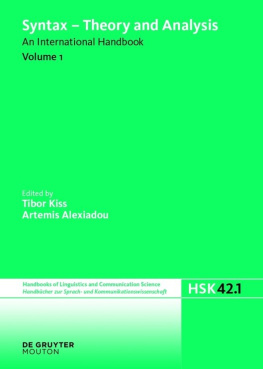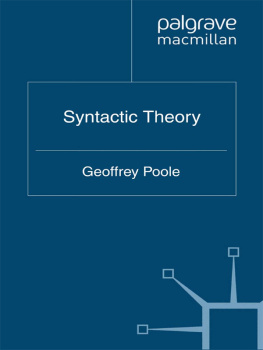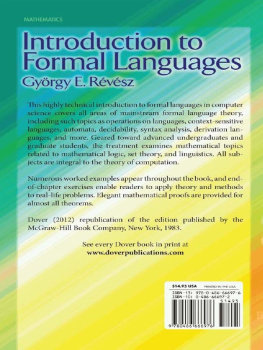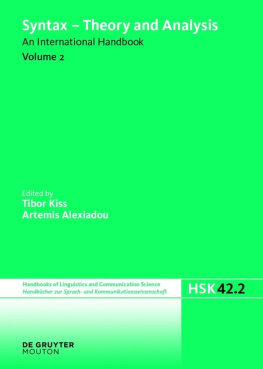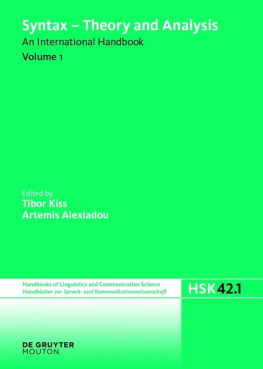Locality and Logophoricity
OXFORD STUDIES IN COMPARATIVE SYNTAX
Richard S. Kayne, General Editor
The Linker in the Khoisan Languages
Chris Collins
The Syntactic Variation of Spanish Dialects
Edited by Angel J. Gallego
Questions of Syntax
Richard S. Kayne
Exploring Nanosyntax
Edited by Lena Baunaz, Liliane Haegeman, Karen De Clercq, and Eric Lander
Dravidian Syntax and Universal Grammar
K.A. Jayaseelan and R. Amritavalli
The Morphosyntax of Portuguese and Spanish in Latin America
Edited by Mary A. Kato and Francisco Ordez
Deconstructing Ergativity: Two Types of Ergative Languages and Their Features
Maria Polinsky
Rethinking Parameters
Edited by Luis Eguren, Olga Fernndez-Soriano, and Amaya Mendikoetxea
Argument Licensing and Agreement
Claire Halpert
The Cartography of Chinese Syntax: The Cartography of Syntactic Structures, Volume 11
Edited by Wei-Tien Dylan Tsai
Beyond Functional Sequence: The Cartography of Syntactic Structures, Volume 10
Edited by Ur Shlonsky
The Architecture of Determiners
Thomas Leu
A Comparative Grammar of Borgomanerese
Christina Tortora
Chinese Syntax in a Cross-linguistic Perspective
Edited by Y.-H. Audrey Li, Andrew Simpson, and W.-T. Dylan Tsai
Functional Structure from Top to Toe: The Cartography of Syntactic Structures, Volume 9
Edited by Peter Svenonius
Micro-Syntactic Variation in North American English
Edited by Raffaella Zanuttini and Laurence R. Horn
Japanese Syntax in Comparative Perspective
Edited by Mamoru Saito
Cross-Linguistic Studies of Imposters and Pronominal Agreement
Edited by Chris Collins
Locality
Edited by Ian Roberts and Enoch Aboh
Aspects of Split Ergativity
Jessica Coon
Variation in Datives
Edited by Beatriz Fernndez and Ricardo Etxepare
Adverbial Clauses, Main Clause Phenomena and Composition of the Left Periphery: The Cartography of Syntactic Structures, Volume 8
Liliane Haegeman
Functional Heads: The Cartography of Syntactic Structures, Volume 7
Edited by Laura Brug, Anna Cardinaletti, Giuliana Giusti, Nicola Munaro, Cecilia Poletto
Discourse-Related Features and Functional Projections
Silvio Cruschina
Mapping the Left Periphery: The Cartography of Syntactic Structures, Volume 5
Edited by Paola Beninc and Nicola Munaro
The Grammar of Q: Q-Particles, Wh-Movement, and Pied-Piping
Seth Cable
Comparisons and Contrasts
Richard S. Kayne
Mapping Spatial PPs: The Cartography of Syntactic Structures, Volume 6
Edited by Guglielmo Cinque and Luigi Rizzi
The Syntax of Ellipsis: Evidence from Dutch Dialects
Jeroen van Craenenbroeck
For a full list of titles in the series, visit www.oup.com/us/comparativesyntax

Oxford University Press is a department of the University of Oxford. It furthers the Universitys objective of excellence in research, scholarship, and education by publishing worldwide. Oxford is a registered trade mark of Oxford University Press in the UK and certain other countries.
Published in the United States of America by Oxford University Press
198 Madison Avenue, New York, NY 10016, United States of America.
Oxford University Press 2019
All rights reserved. No part of this publication may be reproduced, stored in a retrieval system, or transmitted, in any form or by any means, without the prior permission in writing of Oxford University Press, or as expressly permitted by law, by license, or under terms agreed with the appropriate reproduction rights organization. Inquiries concerning reproduction outside the scope of the above should be sent to the Rights Department, Oxford University Press, at the address above.
You must not circulate this work in any other form and you must impose this same condition on any acquirer.
Library of Congress Cataloging-in-Publication Data
Names: Charnavel, Isabelle, author.
Title: Locality and logophoricity : a theory of exempt
anaphora / Isabelle Charnavel.
Description: New York : Oxford University Press, INC., 2019.
Identifiers: LCCN 2019012353 | ISBN 9780190902094 (paperback) |
ISBN 9780190902100 (hardback) | ISBN 9780190902124 (epub) |
ISBN 9780190902117 (pdf)
Subjects: LCSH: Anaphora (Linguistics) |
Grammar, Comparative and generalPronoun. |
Grammar, Comparative and generalPerson.
Classification: LCC P299.A5 C43 2019 | DDC 401/.456dc23
LC record available at https://lccn.loc.gov/2019012353
Contents
This book is the result of a long thought process that lasted more than a decade and happened in many different places. It therefore owes its completion to many more people than I can mention here. Thank you all.
The seed of the book was planted in the spring of 2008 when I attended Daniel (Bring)s graduate semantics II class and Dominique (Sportiche)s graduate syntax III class at UCLA. In both courses, we spent a lot of time thinking about Binding Theory, which led me to explore the interaction between binding, focus, and perspective in the behavior of French son propre (her own). That term paper, which ultimately developed into my UCLA dissertation (and part of my UPMC dissertation), sparked my interest in the puzzling link between reflexivity and logophoricity: the more I observed this pattern in anaphors across languages, the more I was convinced that this link could not be random, but deserved a deep explanation, which could potentially reveal a lot about our linguistic system. Dominique played a determining role in encouraging me to pursue this line of reasoning. I am also grateful to all the other UCLA peopleteachers, advisers, colleagues, collaborators, and visitors, whom I have already thanked in my dissertationfor helping me (in many different ways) to explore this research question.
The bulk of the workin particular, the cross-linguistic extension and the elaboration of the theorywas achieved at Harvard, where I joined the linguistics department in January 2013. Funnily, I could not end up in a better place to develop a project on reflexivity and perspective: many linguists that tackled at least some aspects of this issue were (or still are) part of the Harvard linguistic community, such as Susumo Kuno, Nick Clements, Ren Coppieters, Hskuldur Thrinsson, Luigi Burzio, and my present colleagues Gennaro Chierchia and Jim Huang, to cite a few. In fact, Harvard created the appropriate conditions for me to complete this work by giving me the opportunity to take several research leaves, teach several seminars related to the topic, and hire some graduate students as research assistants. A large part of the cross-linguistic work was thus done in collaboration with my Harvard students: I thank all of those who attended my 2013, 2016, and 2018 graduate seminars and whose useful comments and questions helped me make progress on the project. I especially thank all of those who worked with me as research assistants, without whom I could not have developed the parts about English (Shannon Bryant, Gunnar Lund, Chrissy Zlogar), Korean (Dorothy Ahn), and Mandarin (Yujing Huang).

